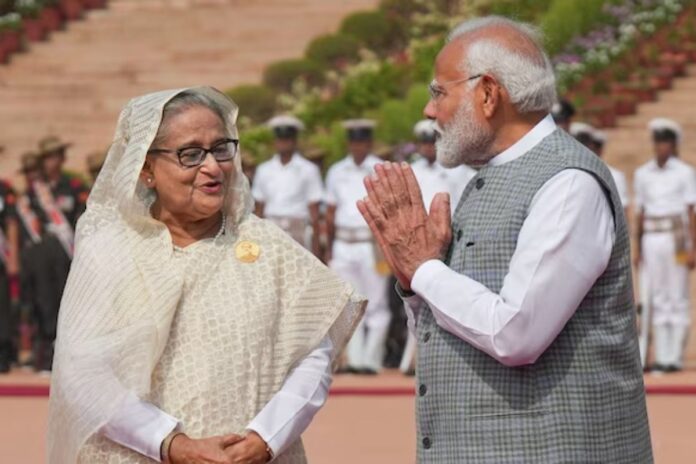Sheikh Hasina’s visa extension has become a significant diplomatic development, sparking debates and tensions between India and Bangladesh. India has extended the visa of Sheikh Hasina, the former Prime Minister of Bangladesh, who has been residing in India since August 2024. Her stay in India began after she fled her home country amidst violent student-led protests, which resulted in over 500 fatalities. This decision comes amidst growing pressure from Bangladesh’s interim government, led by Nobel laureate Muhammad Yunus, to extradite her.
Sources have clarified that this visa extension does not imply that India has granted asylum to Sheikh Hasina. “India does not have specific legislation for granting asylum. This is purely a technical extension to facilitate her stay,” a source explained. Hasina, who has been living under heavy security in a safe house in Delhi, has not been officially offered refuge.
Mounting Pressure From Bangladesh
Bangladesh’s interim government formally requested Hasina’s extradition on December 23, 2024. The demand is tied to her alleged involvement in violent incidents and enforced disappearances during the July 2024 protests. The government has accused Hasina and others of orchestrating unrest, leading to significant loss of life and disruption in the country.
On January 7, Bangladesh’s immigration department announced the cancellation of 97 passports, including Sheikh Hasina’s. Abul Kalam Azad Majumder, a spokesperson for the interim government, stated, “Passports of 22 individuals were revoked for their involvement in enforced disappearances, while 75 others, including Sheikh Hasina, were implicated in the July killings.” The announcement has further escalated tensions between Dhaka and New Delhi.
Political Motivations Behind Sheikh Hasina’s Extradition
Critics have raised concerns that the charges against Sheikh Hasina are politically motivated. Many argue that these accusations are part of a broader strategy by the interim government to consolidate power and suppress dissent ahead of the upcoming general elections. The cancellation of her passport and the legal cases against her have been described as tools to eliminate her influence and remove a potential challenger from Bangladesh’s political arena.
Sheikh Hasina, who served as Bangladesh’s Prime Minister for multiple terms, remains a polarizing figure in her home country. Her leadership has been both praised for economic development and criticized for alleged authoritarian tendencies. Her current predicament underscores the intense political rivalry and instability in Bangladesh.
India’s Delicate Diplomatic Position
India now finds itself in a challenging position. While Sheikh Hasina’s extended stay does not directly threaten bilateral relations, the extradition demand places India in a diplomatic bind. Granting extradition could damage India’s image as a neutral and humanitarian actor in the region, while rejecting it could strain ties with Bangladesh.
India’s approach to this issue is being closely watched by neighboring countries and international observers. The decision could set a precedent for handling politically sensitive refugees and asylum seekers in South Asia. For now, India has chosen to extend Hasina’s visa, but it remains unclear how long this arrangement will last.
This situation reflects the broader complexities of regional politics, where humanitarian concerns often intersect with geopolitical strategies. Sheikh Hasina’s case is not just about an individual’s future; it is a reflection of the intricate and often volatile relationship between India and Bangladesh. As the situation unfolds, it remains to be seen how both countries will navigate this sensitive issue without further escalating tensions.

